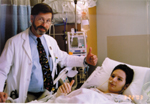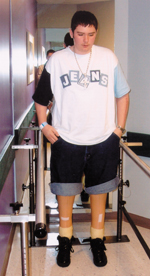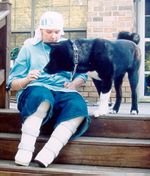
Return to Main Menu |
Without
his feet, but not his soul
by Heather Woolwine
Public Relations
On June 5 and 6, the Children’s Miracle Network (CMN) will air its
annual broadcast from the MUSC Harper Student Center to raise funds for
patients at the MUSC Children’s Hospital. This is the hospital’s 21st CMN
broadcast.
The event will air on WCSC-Channel 5 from 11 a.m. to 4 p.m. both days
and will include on-air celebrities Bill Sharpe and Debi Chard.
Visitors are welcome.
 Surgery's
Dr. Jack Crumbley and Matthew Hess signify that the worst is behind them. Surgery's
Dr. Jack Crumbley and Matthew Hess signify that the worst is behind them.
During the broadcast, viewers will meet some of MUSC’s miracle patients
who beat the odds against illnesses such as cancer, cystic fibrosis, sickle
cell, heart and lung diseases, birth defects, and severe trauma from accidents.
This year’s featured miracle patient is Matthew Hess, 15.
All funds generated by the broadcast will go the MUSC Children’s Hospital.
During the past 20 years, the broadcast has raised more than $6 million,
with last year’s broadcast totaling more than $1 million.
CMN is an international, non-profit organization dedicated to raising
funds and awareness for 170 children’s hospitals in the U.S. and Canada.
To make a pledge during the broadcast, call 792-8000.
For additional information, call the Children’s Hospital Fund special
event line at (843) 792-1112.
Miracle Boy
Matthew Hess and his parents, Mark and Robin, were sure he had the flu.
Half of the school was out because of it.
“I just felt weak and achy one Thursday,” Matthew said. “By Sunday
morning, I knew that my body was shutting down.”
“He went from feverish to absolutely ice cold to the touch,” Robin
said. “We knew something was wrong but we had no idea what we would face.”
Owners of a family business, Mark and Robin were working on Monday
when Robin asked one of her employees if she could make it to work a little
faster so Robin could take Matthew to a doctor. “She walks to work, and
later told me that she ran that day, she just knew that something didn’t
feel right,” Robin said.
Robin and Matthew arrived at the Roper Hospital Berkeley North campus
in Moncks Corner, and health care clinicians immediately had trouble locating
his pulse. He was crashing fast.
Robin and Mark sat in quiet shock when Dan Phillips, M.D., the emergency
room attending physician, told her that Matthew needed to ride in the helicopter
to MUSC Children’s Hospital immediately.
Mark drove to Charleston in record time. “What else can you do? My
son was dying right in front of us,” he said. “I was doing my best to drive
safely, but I drove to MUSC as fast as I could get there. We didn’t know
if he would be alive or not when we arrived. That was the worst 30 minutes
of my life.”
“I was hysterical,” Robin said. “Matthew’s my only son. I remember
looking up to the sky the whole time trying to see the helicopter. I tried
to call and leave messages for family members, but no one could understand
what I was saying.”
Matthew was a healthy adolescent, an avid basketball player, and showed
no signs of congenital heart problems. But a mere three hours later, Matthew’s
dire condition became clear.
“Matthew’s experience may truly be described as an ordeal,” said Fred
Tecklenburg, M.D., Pediatrics. “He was referred to us with a diagnosis
of septic shock after four days of illness and arrived intubated, with
a blood pressure of 80 and responding poorly to IV fluids and a dopamine
drip. His heart had poor cardiac function, and his EKG was consistent with
fulminant myocarditis due to a parvovirus. His condition improved briefly
for about two hours, but it soon became clear that we were losing him.”
According to Tecklenberg, the pediatric cardiology and ICU teams agreed
Matthew’s best chance for survival was to provide mechanical support of
his heart function. In the past, smaller pediatric patients were placed
on ECMO (extracorporeal membrane oxygenation, a form of heart-lung bypass)
but Matthew’s size allowed the use of other circulatory support devices
made for adults.
Jack Crumbley, M.D., Cardiothoracic Surgery, was called to place a
biventricular assist device (BIVAD) in Matthew’s chest. “In the hour it
took to get him ready for open-heart surgery, he almost died. A few more
minutes and he wouldn't have survived to be placed on BIVAD support,” he
said.
Matthew’s newly implanted BIVAD supplied much of his blood flow while
his heart function improved during the next eight days. Matthew’s family
was relieved when the BIVAD was removed, but their emotions jerked back
into overdrive with Matthew’s diagnosis of an equally life-threatening
condition, rhabdomyolsis.
Causing muscle breakdown throughout his body, the condition led to
massive swelling and circulatory compromise of his extremities. The main
muscle breakdown product, myoglobin, precipitated kidney failure. Orthopaedic
surgeons took Matthew back to the OR to relieve the increased pressure
in the muscle compartments of his arms and legs, resulting in six large
scars.
“Every week it seemed like it was something else,” Mark said. “Any
one of those things could’ve taken him. Everything that happened was truly
a miracle. If my wife had gotten him to the hospital 15 minutes later we
wouldn’t be here right now, or if he didn’t come to the Children’s Hospital,
he would’ve died because Dr. Crumbley was the only person in town authorized
to implant the BIVAD. He’s our miracle boy.”
 Matthew
tries out his temporary protheses. Matthew
tries out his temporary protheses.
Ultimately, Matthew would lose both of his feet and would remain on
dialysis for more than a month.
Mark and Robin were surprised by how attached MUSC staff became to
their son. “One nurse in particular from the CTICU, Paris (Wiggins), was
beyond awesome,” said Robin. “Whenever we received bad news about Matthew,
she would cry right along with us. My husband would comfort me and I’d
see another nurse comforting Paris.”
“She was always so worried about him,” Mark said. “She even told me
that she dreamt they were having a conversation about his neck. It would
constantly fall to one side and in her dream she told Matthew to hold his
neck up because she was worried about it getting sore.”
“I took care of Matthew until he was transferred to PCICU," said Wiggins.
”I followed him until he was discharged. Matthew was one of the sickest
patients I have cared for, and I remember the outlook seemed bleak. But
for some reason I never considered anything but a full recovery for him.
Something about him made me realize that we had no choice but to get him
through this ordeal. Seeing him now, and knowing where he's been, is the
greatest gift nursing can give.”
Matthew agreed his care was excellent, rattling off name after name
of those he remembered as doing all they could to make his stay in the
Children’s Hospital comfortable. Robin and Mark appreciated that no one
tried to sugar-coat or hide the seriousness of their son’s condition.
After arriving at the Children’s Hospital Feb. 3, 2003, Matthew woke
up for the first time in early March. At first, all he could verbalize
were thank-yous to God for letting him live. When his parents told him
that a month had gone by, Matthew’s response denoted survival.
“Man, do you know how much make-up work I’m going to have?” he said.
“Matthew is a true warrior,” said Carl Stanitski, M.D., Orthopaedic
Surgery. “His courage, positive attitude, and will to live were daily reminders
to all of us of what really counts.”
“Even though I was in the hospital, I was at peace,” Matthew said.
“I truly believed that God orchestrated the whole thing. It can be difficult
sometimes because I can’t play basketball like I used to, and the everyday
things like taking a shower are hard without my feet, but God gets me through
it and lifts me up.”
“Matthew was so quiet and shy before all of this,” Robin said. “But
because of the illness and amputation, he’s really undergone a personality
change. He’s given his testimony to numerous groups and I think talking
about it is a form of therapy for him.”
Matthew was released from the Children’s Hospital in late March, only
to face more heartache when he arrived home. The dog that he’d grown up
with for the past 13 years, Indy, died two days later. Not more than a
week later, Matthew was back in the hospital with complications.
“I really began to wonder how much one kid could take,” Mark said.
 Matthew
and Riko, the puppy he received on his last discharge from the Children's
Hospital. Matthew
and Riko, the puppy he received on his last discharge from the Children's
Hospital.
After a total of more than 50 days in the hospital, Matthew left the
Children’s Hospital for the last time in late April, and encountered a
surprise in the horseshoe. Mark and Robin gave Matthew a new puppy, an
Akita named Riko.
A little more than a year later, Matthew continues to make strides
towards a full recovery, from dealing with scar tissue and several infections
at his amputation sites to learning to walk again.
“Most people I know hate going back to the hospital for check-ups,”
Robin said. “Not this kid. In fact, I have to take him with the understanding
that it’s going to be an all-day event because he has to say hello to everyone
there.”
“Many elements of the Children’s Hospital, including infectious disease,
physical and occupational therapy, general pediatrics, and childlife, contributed
to the success of Matthew’s care,” Tecklenburg said. “The most remarkable
thing to me, however, was how thankful Matthew was and his positive outlook.”
“The moment he walked into clinic with his new temporary prostheses
took my breath away,” Stanitski said. “What a triumph of the human spirit.
I keep photos from that time posted in our RT clinic. He continues to interact
with other children in similar situations and is a tremendous role model
for them. I also offer my kudos to his parents for their unflagging support
of Matt and his recovery.”
And on July 30, Matthew hopes to make another stride by gaining his
driver’s permit. During the Children’s Hospital’s most recent radio-thon,
the owner of Grady’s Auto Sales on Rivers Avenue invited Matthew onto his
lot to pick out the car of his choice this summer, and pledged to donate
it to him.
Like any teenager, Matthew is anxious to drive his girlfriend, Andrea
Haynes, to the movies and anticipates going to college or seminary school
with his buddy, Brian Wall.
“The most important thing to me no matter what I end up doing is to
continue to let people know that you can’t put off God because you may
think you’ll have time for him later,” Matthew said. “Look at me, I almost
ran out of time. I really feel blessed. The devil may have my feet, but
he can never get my soul.”
Friday, April 9, 2004
Catalyst Online is published weekly, updated
as needed and improved from time to time by the MUSC Office of Public Relations
for the faculty, employees and students of the Medical University of South
Carolina. Catalyst Online editor, Kim Draughn, can be reached at 792-4107
or by email, catalyst@musc.edu. Editorial copy can be submitted to Catalyst
Online and to The Catalyst in print by fax, 792-6723, or by email to petersnd@musc.edu
or catalyst@musc.edu. To place an ad in The Catalyst hardcopy, call Community
Press at 849-1778.
|



 Surgery's
Dr. Jack Crumbley and Matthew Hess signify that the worst is behind them.
Surgery's
Dr. Jack Crumbley and Matthew Hess signify that the worst is behind them.
 Matthew
tries out his temporary protheses.
Matthew
tries out his temporary protheses.